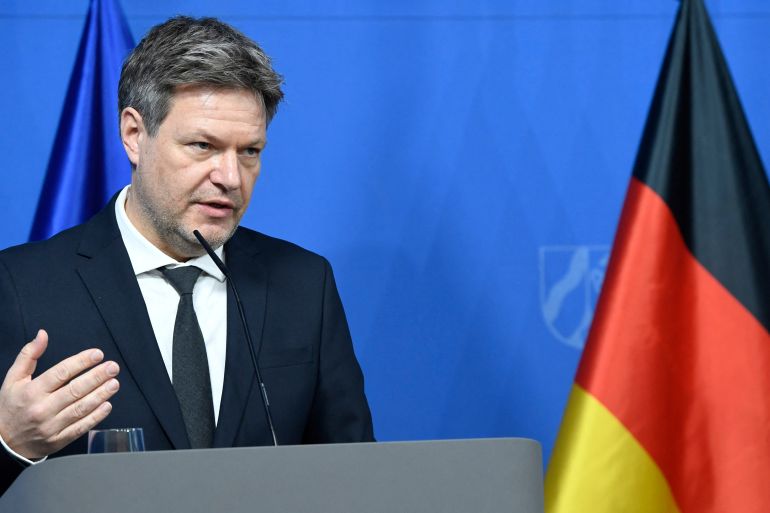Germany courts Qatar and UAE for alternatives to Russian gas
Economy Minister Robert Habeck visits Doha and Abu Dhabi as fears of gas shortages grow amid Russia’s war on Ukraine.

German Economy Minister Robert Habeck has said he will discuss liquefied natural gas (LNG) supply on a trip to Qatar and the United Arab Emirates, as he aims to secure a hydrogen deal, making Germany less dependent on Russia for gas.
Russia is the largest supplier of gas to Germany, according to data on the Economy Ministry’s website. Roughly half of Germany’s LNG imports come from Russia.
Keep reading
list of 4 itemsGermany to ramp up military spending in major policy shift
Germany launches probe into suspected war crimes in Ukraine
Western companies in Russia’s oil and gas sector
Since Russia invaded Ukraine, Habeck has launched several initiatives to lessen Germany’s energy dependence on Russia, including large orders of non-Russian LNG, plans for a terminal to import LNG and slowing the nation’s exit from coal.
Habeck, before the trip starting on Saturday, said the goal was to “establish a hydrogen partnership in the medium term”.
“If we do not obtain more gas next winter and if deliveries from Russia were to be cut then we would not have enough gas to heat all our houses and keep all our industry going,” Habeck told Deutschlandfunk radio.
He will be accompanied on the trip by about 20 representatives from corporate Germany, many from the energy sector.
He also wants to discuss “short-term” LNG supply and to “give the companies that ensure the gas supply in Germany the political framework to become independent of Russian gas, topics that could not be higher on the political agenda”.
More broadly, the European Commission is also working on plans to phase out the European Union’s dependency on Russian gas, oil and coal in five years.
Habeck, also minister for climate affairs, recently visited another gas powerhouse Norway, as well as the current top global exporter, the United States.
Berlin has come in for criticism over its opposition to an immediate embargo being imposed on Russian energy supplies as a means of choking off a major source of Moscow’s foreign earnings.
But Germany believes a boycott could cripple the German economy and saddle society with huge rises in energy prices as well as lead to shortages.
While Russia has come under fire for its war in Ukraine, Habeck conceded in a Friday interview with ARD television that, where energy policy is concerned, a moral dimension “does not really exist”.
Habeck also said on Friday it was imperative to ensure a steady supply stream of supplies but stressed the country must speed up its transition from conventional natural gas to green hydrogen.